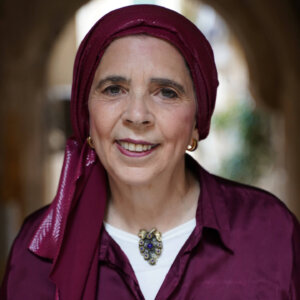Why Israelis like me voted in a right-wing government
A new Likud voter explains why they voted for Netanyahu’s party

A supporter at the Likud party headquarters in Jerusalem, Israel, on Tuesday, Nov. 1, 2022. The sign he is holding reads, in Hebrew, “Netanyahu. A strong right for 4 years. It’s up to you!” Photo by Kobi Wolf/Bloomberg via Getty Images
I voted for Netanyahu’s Likud party last week for the first time.
Most American Jews are decrying the victory of Israel’s right wing in our most recent election, and claiming that it has created a schism between them and Israeli Jews.
The schism is real. But it comes from the difference between our lived realities.
My political awakening
In 1985, at the age of 37, I made a dramatic change in my spiritual path: I started studying Torah and moved to Jerusalem.
I rented an apartment in the Old City’s Jewish Quarter, shopped in the Arab shuk, and concentrated on learning the 95% of Judaism I had missed in my 10 years of Hebrew school.
I was a radical leftist in college, a member of SDS who demonstrated against the Vietnam War. But several years into my time in Israel, I had a rude political awakening.
In 1992, Prime Minister Yitzhak Rabin’s government decided to deport nearly 400 suspected Hamas members to Lebanon rather than keep them in prison. Shortly thereafter, a friend and I attended a screening of a Peace Now documentary in the Arab section of Jerusalem. We sat on the floor of a large room filled with leftist students at Hebrew University.
One long portion of the film featured a close-up shot of the elderly mother of one of these terrorists. She was crying and wailing for the son she might never see again.
As the segment went on and on, my friend and I looked at each other, confused. Why so much compassion for a convicted murderer? I looked around and saw the faces of the other viewers contorted with sadness as they shared the pain of this mother for her deported terrorist son.
That was a watershed moment for me. How could intelligent people be so hoodwinked by such a confusion of perpetrator and victim?
Soon after, the First Intifada broke out. Over the course of several years, more than 200 Israelis were killed.
Early on, by fiat of the Palestine Liberation Organization, the shops in the Arab shuk were forced to close for months in support of the intifada. I traversed the shuk daily on my way to classes. The shopkeepers, mostly middle-aged, sat on stools outside their shuttered stalls, playing backgammon and conversing with their fellows, all looking glum.
Did they really support Yasser Arafat, the then-chairman of the PLO who openly declared his goal of destroying the State of Israel? I had no way to know, no way to have an honest conversation with them in public. But those few shopkeepers who disagreed with the decree and kept their shops open saw them set aflame the first or second night. There was no freedom of speech or dissent under the PLO. As an American, I was appalled.
Years later, I did have an honest one-to-one conversation with Mohammed, a Muslim Arab who owned a small grocery store around the corner from me. At that point, Israel’s prime minister, Ehud Barak, had just offered Arafat virtually everything he’d asked for at the Camp David negotiations.
Mohammed told me, frankly, that he was afraid. After so many years of living under the Israeli government, with its democratic freedoms, he was afraid of living under the PLO’s dictatorial regime.
I wondered why people in the West who professed to care about the Palestinians were willing to hand them over to a ruthless regime known to imprison or execute dissenters.
A dose of reality
An American pollster recently told me that it takes them only one question to determine someone’s political leanings. Respondents are asked to identify which of two statements they consider more accurate:
- With the right education and dialogue, everyone can get along.
- There are bad people in the world who need to be stopped.
I came to Israel believing the first proposition. But 37 years of reality therapy have convinced me of the second.
Six years after signing the Oslo Accords and the famous “handshake on the White House lawn” between Prime Minister Rabin and Yassir Arafat, over 1,000 Jews were murdered and countless others maimed in a rash of suicide bombings and attacks. During this Second Intifada, we literally took our lives into our hands with every bus ride, every foray to a cafe, every shopping trip to downtown.
Israelis typically attend the funerals of victims of terror and war, even those they did not know personally. I remember, on the way home from the funeral of a two-year-old shot in the head by a sniper, saying to my husband, “I’m tired of going to the funerals of children.”
When Israel unilaterally withdrew from Gaza in 2005, the area quickly radicalized. A year later, the terror organization Hamas took over. And when they fired rockets into civilian centers in southern Israel, the world did not leap to our defense. Instead, pro-Gaza demonstrations erupted throughout the world, and Israeli efforts to stop the attacks were condemned as “disproportionate.”
Last May, riots broke out in the mixed Arab-Jewish cities of Ramle, Lod and Acco. Israelis watching the news looked in horror at images of synagogues going up in flames in the State of Israel. Those images accompanied many of us into the voting booth this November.
Every wave of terror, every round of violence has pushed Israeli Jews farther to the right. The left-wing Labor party that ruled Israel for its first 29 years barely made it into the Knesset in last week’s election, and the far-left party Meretz did not even cross the electoral threshold.
Last week, Israelis voted emphatically for a strong right-wing government. Because more than we care about what kind of society our children will live in, we care that our children will live at all.
To contact the author, email [email protected].
A message from our Publisher & CEO Rachel Fishman Feddersen

I hope you appreciated this article. Before you go, I’d like to ask you to please support the Forward’s award-winning, nonprofit journalism so that we can be prepared for whatever news 2025 brings.
At a time when other newsrooms are closing or cutting back, the Forward has removed its paywall and invested additional resources to report on the ground from Israel and around the U.S. on the impact of the war, rising antisemitism and polarized discourse.
Readers like you make it all possible. Support our work by becoming a Forward Member and connect with our journalism and your community.
— Rachel Fishman Feddersen, Publisher and CEO





























